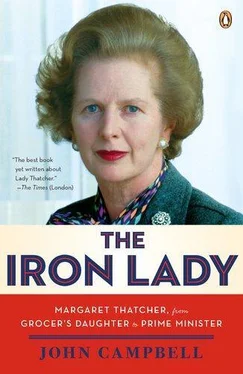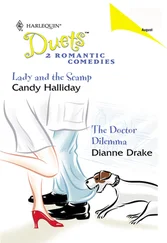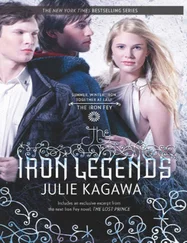This amounted to more than a gap in cultural knowledge. More important, she did not receive the sort of education that delights in the diversity of different perspectives or might have exposed her to the wisdom of philosophic doubt. Her mind dealt in facts and moral certainties. She left Oxford, as she went up, devoid of a sense of either irony or humour, intolerant of ambiguity and equivocation. Her study of science at school and university chimed with her strict moral and religious upbringing and reinforced it, where a more liberal education in the arts or humanities might have encouraged her to question or qualify it. This rigid cast of mind was a source of unusual strength in Mrs Thatcher’s political career. But it was also a severe limitation, exacerbating a lack of imaginative sympathy with other views and life-experiences which ultimately restricted her ability to command support.
She left Oxford in the summer of 1947, a qualified research chemist. For the past year she had been working under Dorothy Hodgkin, trying to discover the protein structure of an antibiotic called Gramicidin B, using the same technique of passing X-rays through crystals that Professor Hodgkin had successfully applied to penicillin. As it happened Gramicidin B was more complicated than penicillin, and she failed to crack it. There was no discredit in this: success was not finally achieved until 1980. She was still awarded her degree, but it was not the degree she wanted. In the short run it was the only qualification she possessed: it was as a chemist that she must start her working life. But she had already set her mind on going into politics.
ONLY twenty-one and fresh down from university, Margaret Roberts at least had a marketable qualification. In her final term at Oxford she had signed on with the University Appointments Board. She attended a number of interviews with prospective employers before being taken on by a firm called BX Plastics, based at Manning-tree in Essex.
BX Plastics was a well-established company which developed new materials for such products as spectacle frames, raincoats and electrical insulation. During the war it had been taken over by Distillers; later, it was swallowed by the American Union Carbide Corporation, and finally by BP. In 1947 the company employed about seventy researchers. Margaret Roberts was one of ten graduates taken on that summer – three of them women, who were paid £50 a year less than the men. (The men got £400, the women £350.) She had understood that she was going to be Personal Assistant to the Research and Development Director, but was disappointed to find herself just another laboratory researcher, working on surface tensions to develop an adhesive for sticking polyvinyl chloride (PVC) to wood or metal.
During the eighteen months she worked at BX Plastics she lived in digs ten miles away in Colchester. She lodged with a young widow, Enid Macaulay, at 168 Maldon Road. Another lodger, probably not by coincidence, was the secretary of the local Young Conservatives. The likelihood must be that the first thing Margaret did on coming to Colchester was to approach the YCs for help with finding accommodation. Mrs Macaulay, interviewed in the early 1980s, remembered two things about Miss Roberts: first that she was always very smartly turned out – ‘nice suits, nice blouses, nice gloves’; and second, her determination to be a politician. She was always busy with political activity of one kind or another, either with the YCs in Colchester or away at weekend conferences. 1
When she was not away on Sundays, however, she kept up her religious observance. She attended the Culver Street Methodist Church and, as she had done at Oxford, joined other young people on missions to the surrounding villages. She may have preached: she is certainly remembered reading the lesson, with her too-perfect elocution. To her fellow Methodists in Colchester she appeared very grown up and sophisticated, more at ease with older people than she was with her contemporaries.
So far as we know she took no active steps to advance her political career. Though she attended weekend conferences, cultivated her contacts and practised her speaking, it was too soon to start looking for a constituency. She did not even apply to go on the Central Office list of prospective candidates. One would like to know what her imagined timetable was, how long she intended staying with BX Plastics before starting to read for the Bar, her next objective. As it was she had a lucky break. She attended the 1948 party conference at Llandudno – not as a representative from Colchester, but representing the Oxford University Graduates Association. An Oxford acquaintance introduced her to the chairman of the Dartford Conservative Association, John Miller, who happened to be looking for a candidate. This introduction changed her life.
Dartford had already been seeking a new candidate for a year. For twelve months Conservative Central Office had been sending lists of possible contenders, but Miller and his committee did not think much of any of them. Dartford, admittedly, was not an enticing prospect – though it was a good place for a first-time candidate to cut his teeth. It was a rock-solid Labour seat with a majority in 1945 of more than 20,000, and one of the largest electorates in the country, covering the three north Kent estuary towns of Dartford, Erith and Crayford. The local Association was run down, following ‘a succession of mediocre agents’. 2Miller, an energetic local builder, was determined to pull it round. He was initially doubtful about the idea of a woman candidate, taking the conventional view that a tough industrial constituency was no place for a woman. But he introduced Miss Roberts to other members of his delegation over lunch on Llandudno pier, and they were impressed. Miller could see that the novelty of a forceful young woman might be the shot in the arm his Association needed. She was invited to put her name forward. Meanwhile, Miller wrote again to Central Office mentioning her, but also requesting more names for consideration. They sent him another eleven, but agreed to see Miss Roberts if she would like to come into the office. She did, and ‘created an excellent impression’. 3
Miller still tried to persuade a number of local businessmen to stand – among them a paint manufacturer named Denis Thatcher who had recently stood as a Ratepayers’ candidate for Kent County Council. ‘He came to my office in Erith and asked me to think about it,’ Denis recalled. ‘I said no without hesitating.’ Instead a slate of Central Office-approved hopefuls was interviewed in London in late December, from whom five were shortlisted for a run-off in Dartford at the end of January 1949. On 14 January the deputy area agent wrote to the deputy party chairman:
Although Dartford is not a good constituency for a woman candidate there is a possibility that Miss Margaret Roberts will be selected; her political knowledge and her speaking ability are far above those of the other candidates. 4
The Dartford Executive agreed with the area agent. Miss Roberts was selected over four male rivals and recommended for adoption by the full Association four weeks later.
The same area agent attended the formal adoption meeting on 28 February and reported enthusiastically to Central Office that Miss Roberts had made a ‘brilliant’ speech attacking the Labour Government, and the decision to adopt her was unanimous. 5The meeting was also notable for Alfred’s presence on the platform – the first time that father and daughter had ever spoken from the same platform.
There is a piquant symbolism in Alfred’s presence at this meeting; also present that evening was Denis Thatcher. He was there as an ordinary member of the Association, but he was invited to supper afterwards to meet the candidate. Denis was then aged thirty-three, general manager of Atlas Preservatives, the family paint and chemicals business founded by his grandfather. During the war he had married a girl named Margaret (known as Margot) Kempson; but she was unfaithful while he was away fighting in Italy, and the marriage did not survive. He was now divorced, and openly looking to remarry. It seems that he was immediately struck by Margaret Roberts, who bore a startling resemblance to Margot. After supper he drove her back to London to catch the last train home to Colchester. This was the start of the relationship that became the anchor of her life. It developed gradually over the next two years; but it began that evening of her adoption meeting, which therefore marks the critical watershed of her career. She arrived, as it were, on her father’s arm: she left with her future husband. Her adoption for Dartford was thus the moment when she turned her back on Grantham. Oxford was an escape route; Colchester no more than an interlude. But though she did not go on to win Dartford she did put down roots, both political and personal, in suburban Kent. By marrying Denis Thatcher she embraced a Home Counties lifestyle. Of course Grantham remained in her blood, but for the next twenty-five years she steadily suppressed it.
Читать дальше












